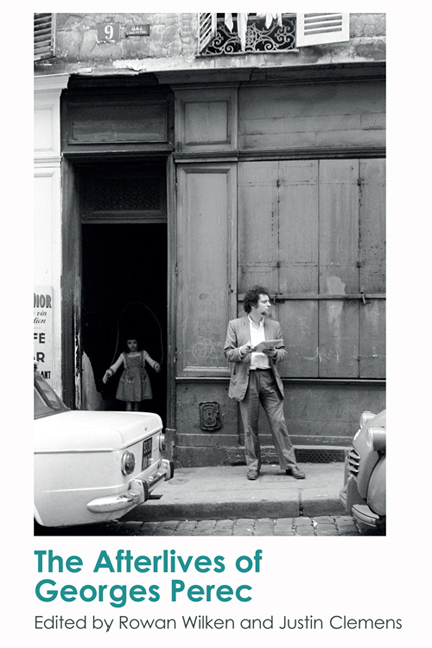Book contents
- Frontmatter
- Contents
- List of Figures
- Acknowledgements
- Notes on Contributors
- 1 Posthumous News: The Afterlives of Georges Perec
- PART I Art of the (Un)realisable
- 2 Georges Perec's Enduring Presence in the Visual Arts
- 3 Apoetic Life: Perec, Poetry, Pneumatology
- 4 UnSearching for Rue Simon-Crubellier: Perec Out-of-Sync
- 5 Invoking the Oracle: Perec, Algorithms and Conceptual Writing
- PART II The Poetics of the Quotidian and Urban Space
- PART III Ludic Intensities and Creative Constraints
- PART IV Productive Problems of Description and Transcription
- Afterword
- Index
4 - UnSearching for Rue Simon-Crubellier: Perec Out-of-Sync
from PART I - Art of the (Un)realisable
Published online by Cambridge University Press: 07 December 2017
- Frontmatter
- Contents
- List of Figures
- Acknowledgements
- Notes on Contributors
- 1 Posthumous News: The Afterlives of Georges Perec
- PART I Art of the (Un)realisable
- 2 Georges Perec's Enduring Presence in the Visual Arts
- 3 Apoetic Life: Perec, Poetry, Pneumatology
- 4 UnSearching for Rue Simon-Crubellier: Perec Out-of-Sync
- 5 Invoking the Oracle: Perec, Algorithms and Conceptual Writing
- PART II The Poetics of the Quotidian and Urban Space
- PART III Ludic Intensities and Creative Constraints
- PART IV Productive Problems of Description and Transcription
- Afterword
- Index
Summary
My idea of literature was of something that could and would intervene in reality. Or at least that's the way I thought of it then.
Italo CalvinoWhen nothing is sure, everything is possible.
Margaret DrabbleAll other resemblances to living persons or to people having lived in reality or fiction can only be coincidental.
Georges PerecStay, illusion!
ShakespeareOne of the things writing does is wipe things out.
Marguerite DurasArt consists of limitation.
G. K. ChestertonI'd rather regret the things I've done than regret the things I haven't done.
Lucille Ball‘A SCHEDULE OF’ COMPLICATIONS
While it might seem like a surfeit of epigrams prefacing this tapestry that you are about to Unweave (essay, text, fly specs on a page or screen, the subliminal flicker of codified light), this assemblage of samples already performs what you are about to do in reading this text. It has already said what will have to be, and have been said. All a matter of tense, colliding times, duration and anachrony, it puts the pieces together in the manner of a jigsaw, then takes it apart, out-of-context, out-of-time. Epigrams are at once rhetorical figures of what is to come, other words doing the work for someone else, suggestive, prefatory and oracular. They are a kind of mime or ventriloquism, prolonging entry into another text with the sign-sound proxies of others speaking. Not ‘dismantled’, ‘broken down’, ‘read’ or ‘interpreted’. They are gestures out-of-sync.
A label then, on a parcel addressed to someone, is another assemblage of Unwords. Its specificity is a contract between signs and atoms, artifice and edifice:
In another context its dark borders and curlicue italics would announce a death, notifying a recent absence which can no longer be delivered, made present or signed for. The brittle uncertainty and rigorous ambivalence of the pharmakon, the either/and/or of writing, becomes the excessive irresolution in print of a street address in a verifiably real city that is nowhere to be found outside page space. Yet, it is potentially located somewhere in a city that exists in empirical space if it is sought after with enough suspension of belief as well as its opposite.
- Type
- Chapter
- Information
- The Afterlives of Georges Perec , pp. 69 - 84Publisher: Edinburgh University PressPrint publication year: 2017



